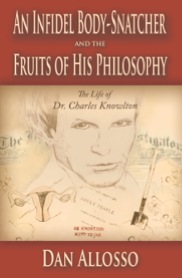By Scott Lohman
 An Infidel Body-Snatcher and the Fruits of his Philosophy: The Life of Dr. Charles Knowlton
An Infidel Body-Snatcher and the Fruits of his Philosophy: The Life of Dr. Charles Knowlton
by Dan Allosso, 270 pages, CreateSpace Independent Publishing
The history of Freethinking people is not always about the big characters of our movement. Most of what has happened was done by those of us who do boring jobs and are active in Freethought outside of any profession. Charles Knowlton was one of those. He was a medical doctor who helped move his profession away from treating the "four humors" as they were called.
.Knowlton was born in 1800 to a New England farm family. The family was pretty typical of the time, farming to survive and provide income. Knowlton had early exposure to the medical field of the time and, fortunately, he lived to tell about it. Medicine of that time was not based on understanding the body, its organs, fluids, and diseases; but of the "four humors". These were commonly known as blood, phlegm, black and yellow bile. Medicine was then the practice of getting you to balance those four substances. This was done via bleeding and the taking of potentially dangerous substances. Knowlton was diagnosed with a disease called "gonorrhea demientium." This was the contemporary term for ejaculating while sleeping, an occurrence we now call nocturnal emissions. Knowlton's “disease” shows that knowledge of our bodies is tantamount to being able to properly treat medical conditions.
Knowlton was treated by a number of doctors and spent his youth quite sickly. He actually recovered when he stopped getting treated. He was influenced by the family of the woman he married, who were freethinkers and non-believers. It was under the influence of his father-in-law that he learned the importance of studying, hands on learning and acquiring knowledge. Knowlton decided to pursue medicine. Professions were mainly learned by self teaching and studying under an already practicing doctor. Knowlton wanted to know more than the books could give him. To do that he needed to learn from actual bodies which meant he needed to look at actual bodies. This was before people donated bodies to science and schools, so he had to acquire them by other means—thus his being a body-snatcher.
Allosso details how Knowlton was able to learn his profession. He was also interested in the philosophy of materialism. He spent a great deal of time writing a book called The Elements of Modern Materialism. Most books were sold via subscriptions, in which people were pre-sold the book to finance its publication. Knowlton ended up going into debt producing the book. He had a small medical practice, but it was barely covering living expenses.
Knowlton also helped write a book on sex education and methods of birth control called the Fruits of Philosophy. Unsurprisingly, doing a book on that subject, especially at that time, was a tough sell.
Allosso does a good job capturing the spirit of the times and the life of Charles Knowlton. History is not always found with big characters but many times with those of living normal somewhat ordinary lives.

